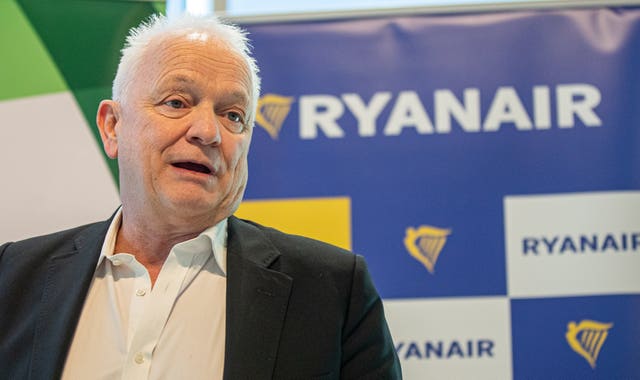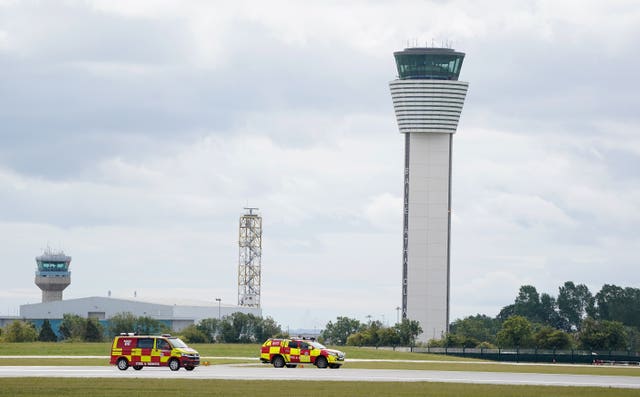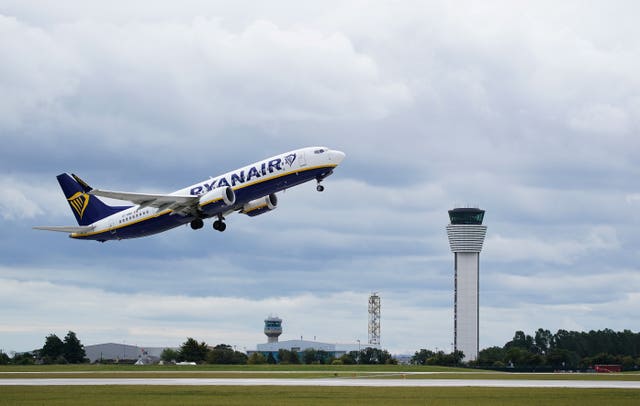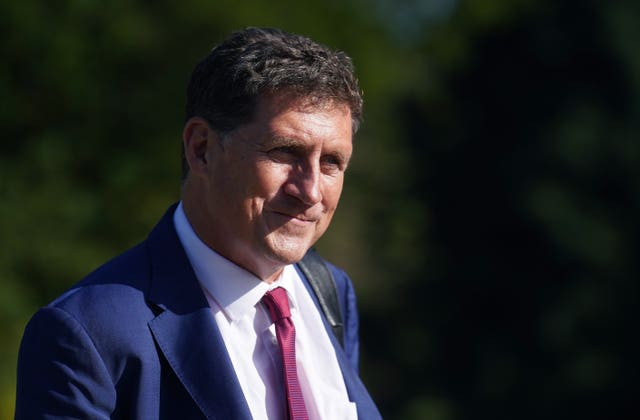Dublin Airport ‘categorically denies’ Ryanair’s claims after winter flight cuts
Ryanair said it is cutting its winter 2023/2024 schedule at Dublin Airport in response to increased charges.

DAA, the operator of Dublin Airport, has rejected claims by Ryanair over charges and environmental incentives at the airport.
It comes after Ryanair said it is cutting its winter 2023/2024 schedule at the airport in response to hiked charges.
The airline has cancelled 17 routes and moved 19 aircraft to alternative European airports which it says incentivise airlines with quieter, lower emission aircraft.
Ryanair chief executive Eddie Wilson said this will be a roughly 10% cut on passenger numbers out of the airport compared to last year.

In a statement later contested by the airport operator, Ryanair said it made the decision due to DAA’s “rising passenger charges of 45%, ongoing Capex mismanagement and their failure to deliver a meaningful environmental incentive scheme that rewards lower emission aircraft”.
It said: “DAA has a history of mismanagement at Dublin Airport, including understaffing summer security, wasting taxpayers’ money on ill-thought-out infrastructure projects and failing to support low-cost access and sustainable growth.”
The airline said the 19 planes are part of its “gamechanger enviro-friendly” fleet of Boeing 737 8200 aircraft, which it said reduce noise by 40% and CO2 emissions by 16% while carrying 4% more passengers per flight.
The company initially said DAA is raising its “already excessive charges by a ludicrous 45%”.

But DAA said regulated charges at the airport, which are set by the aviation regulator, are set to rise by only 6% in 2024.
In a statement, it said it “categorically denied false claims by Ryanair”, with chief executive Kenny Jacobs saying he was “surprised and disappointed” by the airline’s announcement.
He said: “I am baffled why any airline with sustainability ambitions would choose to turn down the opportunity to operate lower CO2 emission and less noisy aircraft at Dublin Airport by turning down the new discount schemes.
“The Ryanair decision to reduce their Max fleet at Dublin Airport next winter is adding to their cost base when by actually increasing the Max fleet they would in fact pay even less in 2024 that they will in 2023.”
Mr Jacobs said Ryanair’s claim of a 45% increase in charges in 2024 is false.
He added: “There is nothing approaching a 45% proposed rise in pricing at Dublin Airport which is patently false for anyone who has studied the regulators’ determination last December.
“Rather than depending on back-of-a-scratchcard mathematics, I would urge those making such false statements to redo their sums and more importantly study the range of sustainability incentives proposed at Dublin Airport, and join us on the journey to a carbon-free aviation eco-system over the coming years.”
The Commission for Aviation Regulation, now the Irish Aviation Authority, said in December a nominal price cap of 8.68 euro in 2023 will increase to 9.23 euro in 2024 and includes inflation projections and the assumption Dublin Airport will deliver on its own investment plan.
This is a 6.3% year-on-year rise.
The same document gives a nominal price cap of 11.73 euro for 2026, which is a 46% increase on the 8.00 euro final price cap in 2022.
In a later statement, Ryanair clarified that it was basing its figure on the 2026 rates.
It added: “Running an airport is far more complex than just issuing press releases.”
The airline did not respond to a question on whether it was fair to use figures which included projected inflation.
Ryanair was also critical of DAA’s three billion euro capital expenditure programme, saying it includes a “portfolio of unnecessary vanity projects” which it said will not benefit passengers.
It said: “A prime example of this is DAA’s 250 million euro cargo tunnel. This tunnel is superfluous and could easily be replaced with a tried and tested low-cost alternative like the crossing system at Cologne Airport – home of Europe’s Aviation Safety Agency.”
Ryanair said DAA should be planning to expand Dublin Airport’s terminals one and two for passenger and connectivity growth.
At a press conference in Dublin, Mr Wilson said: “Unlike most other EU airports, DAA is unfortunately focused on increasing passenger charges by 45% and wasting 250 million euro on a tunnel the same size as the Dublin Port tunnel that is not needed.
“DAA needs to build low-cost infrastructure to support passenger growth and connectivity but has failed to implement a growth incentive scheme or, indeed, lower charges that reward those airlines who invest in lower emission aircraft.
“The Irish Government implemented an innovative industry-leading traffic recovery support scheme post-Covid, with Ryanair responding with +117% recovery vs pre-Covid levels, ensuring Ireland’s recovery of connectivity and tourism.
“Unfortunately, all this good work is now going to unravel with DAA’s misguided policy of increasing charges by 45%. Dublin Airport isn’t Heathrow; Dublin competes for traffic with other European airports, and with less airline seat capacity returning post-Covid, airports must respond with incentives to attract that smaller pool of aircraft seat capacity.
“Sadly, DAA are oblivious to what is happening at airports elsewhere in Europe and is intent on rating charges by 45%, with hugely damaging consequences for Ireland.”
The DAA chief executive described the underpass tunnel project as an “optimum” safety solution for operations on the airfield.
Mr Jacobs said: “Ryanair’s claim that an underpass is not needed at Dublin Airport is, once again, false. The underpass is essentially a safety project, which will contribute to effective and efficient airfield operations and maintain operations in the west apron.
“We have reviewed all options, including solutions in place at other European airports, and both the aviation regulator and DAA agree the underpass solution is the optimum one from a safety perspective, and we never compromise on safety.”
Pointing to comparatively low air traffic recovery in Germany following increased charges, Mr Wilson said: “It’s absolutely going to happen here because there’s no incentive for Ryanair to retain aircraft here.

“You will see, gradually, a reduction in capacity and there’s nobody else going to fill that gap.
“Dublin is uncompetitive, connectivity, airline investment and traffic goes down – bad for tourism.
“And what we want the DAA to do is at least freeze charges, put in incentives for airlines to actually grow, put in an environmental scheme – you could do this on a cost-neutral basis because what you can say is those who put in fuel-efficient, less noisy aircraft get lower charges and those that don’t make that investment pay higher charges.
“They need to stop wasting money on a tunnel and expand existing infrastructure because this is going to be bad for the country.”
He said the 19 aircraft will be moved to Luton and “across Europe”, including airports in Spain and Italy.

Asked if passengers should expect prices to increase on routes with reductions, Mr Wilson said: “Where you have less of anything and you’ve got demand, well then prices will rise.
“You get into a sort of a death spiral with this, because if you’ve got a market where people have an expectation at a particular level and you contract that market, well then the price goes up – but it’s very easy to stop.”
Asked when he last spoke to the Irish Minister for Transport and Environment Eamon Ryan about the airline’s concerns, Mr Wilson said: I’ve written to him three times this year to tell him this is going to happen, never getting anything back.”
He said Mr Ryan has a “unique” opportunity to be a world leader on modulated charges at airports to make higher-polluting airlines pay more.
Mr Wilson said there will be no initial job losses at Ryanair due to the decision but the airline will have to “see what happens next summer”.
He said he is not hopeful that any of the additional Boeing 737 8200 aircraft due to be delivered to the airline will be put in Dublin.
DAA said it announced proposals in May which would incentivise airlines to operate more environmentally-friendly aircraft and charge airlines who fly high-emission aircraft more.
It said the discount would apply to its “ultra-low cost aeronautical charges”, which it described as the lowest of any capital city airport in Europe.





